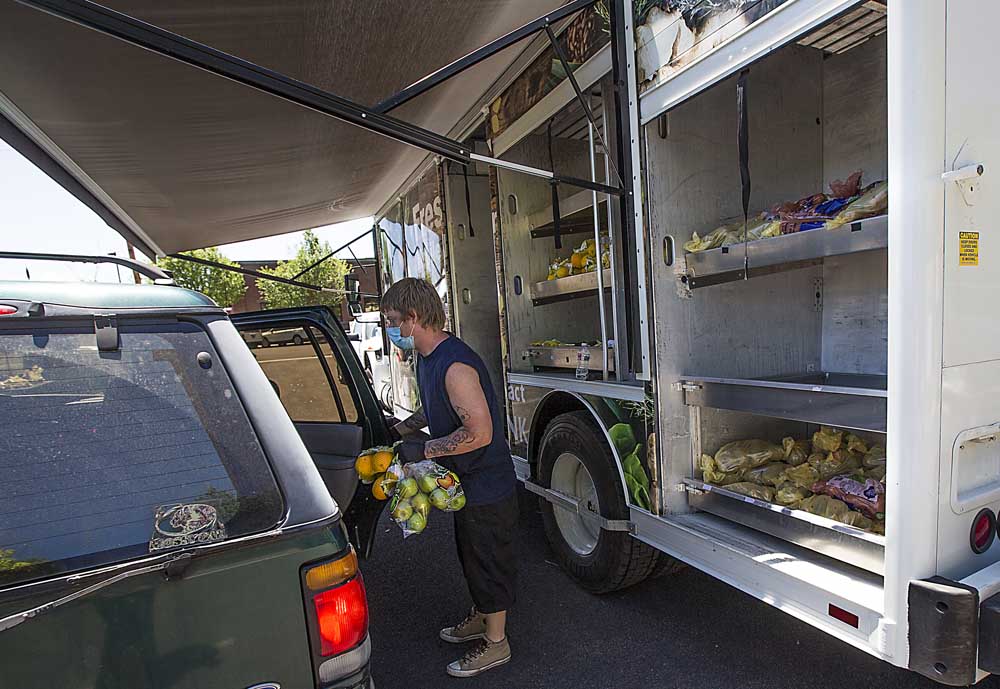As a parent, I would never …
Published 4:00 am Friday, February 11, 2011

- Chris Mezzetta’s daughter Isabella, 8, didn’t share her dad’s enthusiasm for basketball and he resorted, unsuccessfully, to bribery to try to get her to play.
Most parents at some point find themselves saying, “I swore I’d never … ” Use disposable diapers. Let my kid watch TV. Let my kid sleep in my bed. Bribe. Most parents also eventually fall short of their own expectations.
That can be very demoralizing, symbolic of failure. Or it can be enlightening for those who accept that their notions about parenthood were unrealistic.
Whatever it is, it’s pretty common, said Dennis Lynn, an instructor of human development and family sciences at the Oregon State University-Cascades Campus. Before having children, people tend to have lofty ideals about how parenthood will unfold, he said.
“Then reality hits.”
What people learn during the experience of parenting can change their priorities, Lynn said. Accommodating each child’s individual temperaments and sensitivities can push parents to do things they never thought they’d do.
Bribery
Bend resident Chris Mezzetta, a father of three girls, swore he would never bribe his kids.
“It teaches them the wrong lesson. It teaches them to only do something if there is a reward that follows,” he said.
Many parenting books say so. But many parents resort to it anyway.
Mezzetta, a content manager for a company that publishes niche news websites, loves sports and coaches seventh-grade boys basketball. He sympathizes with the boys who have never played basketball, who struggle with the basic skills of the game.
Mezzetta’s third-grade daughter Bella is getting tall, he said. “The first thing I always ask tall people is, ‘Do you play hoops?’ and when the answers is, ‘No,’ I’m always disappointed. If Bella’s going to play, she needs to start soon,” he said.
He tried to talk her into playing in a recreation league. She said no. He offered her a Wii (which he said he planned to get for Christmas anyway). She didn’t answer. He offered her his extra computer. She said yes. But just minutes later she told him, “ ‘Daddy, I don’t care what you give me, I’m not going to play basketball. Why do you keep offering me these things to get me to play?’ ” he said. “And so I was caught. And she didn’t play.”
Loosen up
Lynn said if parents succumb to bribery — or whatever it is they swore they’d never do — they need to remember that their entire parenting experience is not symbolized in that one act.
“We need to relinquish the goal of being a perfect parent,” he said. “Most parents, when they get in the middle of it, realize they just need to loosen up … keep a sense of humor and humility.”
Bend mom Shannon Lester, who runs a landscaping business with her husband, had to loosen up about her daughter’s sense of fashion. Lester swore she would never let her kids dress in mismatched outfits. Before having her own children, “I thought parents were too lazy to help their children get dressed,” she said.
But then her daughter Rachel, now 6, wanted to start dressing herself, a way of self-expression.
“I would buy her beautiful outfits and she would insist on mixing them with other clothes that clashed, in my eyes,” she said. “I realized that it is more important to let her dress herself as a way to gain self-confidence and independence than to put her down for dressing in a way that I may be embarrassed by.”
Ellen Grover, a Bend attorney whose children are 6 and 4, is loosening her resolve never to buy her kids a video game. She believed video games “create lazy and unimaginative kids and objectify violence, plus it’s giving in to the electronics industry’s constant marketing for more and better,” she said. “But lately I’ve been thinking, the kids want Wii!”
Grover recently read a newspaper story about the benefits of gaming, about how it’s better to educate her kids about appropriate use of games at home, she said. “Is that just a rationalization? Or is it valid? Help!”
Lynn said most parents’ expectations of themselves are more rigid with the first child.
Gina Dunker, of Bend, who has a 19-year-old and a 4-year-old, was determined not to let her first born sleep with her. But by the time her second child came along, she was a different person and a different parent.
When Dunker had Kayla 19 years ago, she believed her daughter was better off sleeping independently, in her own room. Even Sydney slept in her own room until she was about 2 1/2. Then when the family moved and Sydney grew out of a crib and into a toddler bed, she started coming into her parents’ room nightly. All the getting up and putting her back to bed was taking its toll.
“Mommy and Daddy started getting lazier, just too tired to do this every night,” Dunker said. “We started just letting her lay down in our bed when she would wake up in the middle of the night.” She couldn’t believe she had become someone who let their child sleep with her.
“My routines seem to have been a lot better with my first child,” said Dunker, who was at that time a young and single mom. A lot of things are different now, she said. One of them is, it’s harder to deal with less sleep as an older parent.
A parent’s self-image
Sometimes, things parents swore they’d never do have more to do with their own identities than how they act toward their children.
Diane Backus, a licensed psychologist who works part time, swore, among other things, that she’d never become a “social misfit” who owns a motor home and shops weekly at Costco. It wasn’t how she imagined her future self.
Backus, of Bend, said she never wanted to be someone “who had little of interest to talk about. … I had a fairly interesting life and a great deal of interest in others.” Then she had three kids and “lost my social skills,” she said.
“Attempts to meaningfully communicate in the presence of my children were futile,” she said. “Women I was very interested in shared details about important matters and, while I worked very hard to focus my attention, I’d be wiping excretions from my 3-year-old’s nose, trying to distract my 1-year-old from rifling through a stranger’s purse, considering how to handle the fact that my 3-year-old whose nose I had recently wiped had been drinking from another child’s water bottle, and scanning the horizon for my 6-year-old, who quickly and mysteriously disappeared after mentioning something about ladybugs and unicorns. Since my own life is consumed with (all these) thoughts, I have little of my own to contribute.”
A former volunteer for the Student Conservation Association, (an organization that trains and educates environmentalists and conservationists), she once prided herself in carrying everything she needed to survive for weeks in a backpack. But camping with children was so different.
“Several misguided attempts at camping, involving freezing children who, for some reason, couldn’t remain in their sleeping bags,” seeded an evolution out of the backpack and into a van. Then the van got crowded and was still cold. Santa just bought the family a motor home.
And, as for Costco, her three children love the free samples, and “I really do need two gallons of milk, two loaves of bread, and three cartons of fruit per week, not to mention diapers, wipes, chocolate-covered almonds,” she said.
Keeping it in perspective
Carleton Kendrick, a Massachusetts-based family therapist, author and speaker, has studied families and parents throughout his career. He offered a different perspective due to his experience working with adults who had weathered abusive childhoods.
The parents in this story might have disappointed their own expectations, but they haven’t permanently scarred their children. There’s a big difference between bribing and hitting. Vowing not to hit your kid is an emotional decision that comes from the heart, he said. Deciding whether to bribe or buy a Wii is a decision that come from the head, he said.
Kendrick said the question parents should ask themselves is: “How important is this to me? I don’t know if you need to get beyond that.” Once a parent has decided it’s not that important, he said, “Laughing about it is a good way to deal with it.”






